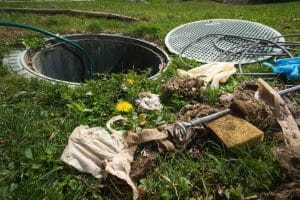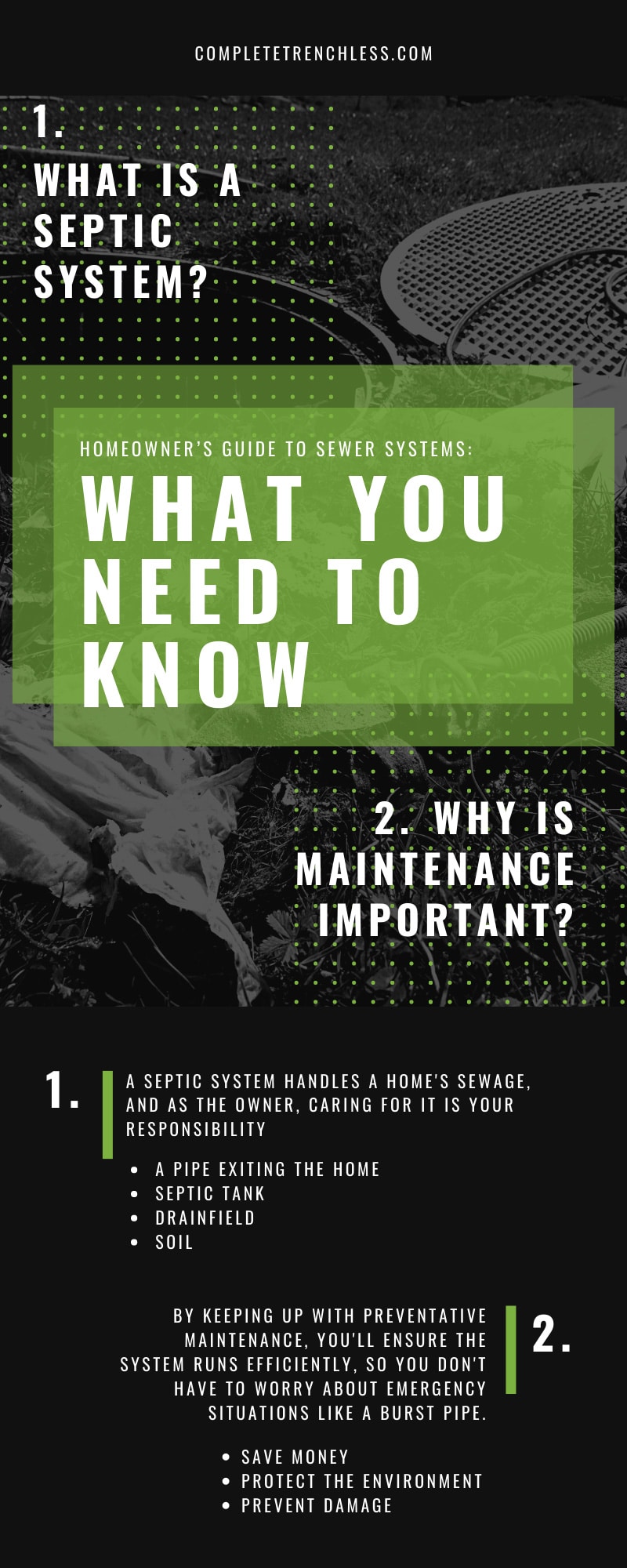Homeowner’s Guide To Sewer Systems: What You Need To Know

Although many say septic systems are a thing of the past, quite a few homes still have one. A septic system is vital to homes that are off the grid or in rural areas. While we often worry about the AC going out or the roof leaking, maintaining your septic system is just as important. If you’ve just moved into your first house, then check out what you need to know in this homeowner’s guide to sewer systems.
What Is a Septic System?
A septic system handles a home’s sewage, and as the owner, caring for it is your responsibility. While all homes don’t have a septic system, those in rural areas are more likely to have one. By neglecting maintenance, you risk heavy replacement fees or a leak that could contaminate groundwater supplies. But by keeping a routine maintenance schedule and caring for the system, it could last for 40 years!
Pro Tip
If you’re shopping for a home and find out that it has a septic system, it’s best to find out when it was last pumped. Asking questions about home maintenance gives you better insight into possible home repairs to ensure you don’t wind up with a money pit.
A Look Into the Main Parts
Septic systems have several parts that allow them to work effectively, and by caring for these parts, you keep it functioning properly. The four main components include:
- A pipe exiting the home: Takes water from your home and to the septic tank.
- Septic tank: Holds wastewater until it becomes a sludge-like substance.
- Drainfield: Where wastewater exists. Some homeowners who have septic systems need a reserve a drainfield.
- Soil: Treated wastewater moves into soils for further treatment.
Wastewater from all your plumbing fixtures goes into this tank. Anything that’s not solid flows into the drainfield and into the soil, while the solids remain inside of the tank. Each of these septic system components is important, and if one breaks, then the system may not function properly.
Why Is Maintenance Important?
You shouldn’t start thinking about maintenance when you suspect there’s an issue with your septic system, but it should still remain on a schedule. By keeping up with preventative maintenance, you’ll ensure the system runs efficiently, so you don’t have to worry about emergency situations like a burst pipe.
Maintaining pipes also helps:
- Save money: Septic and waterline repairs are pricy, but maintenance lessens fees.
- Protect the environment: Septic leaks are hazardous to water systems and the surrounding areas.
- Prevent damage: A backup can heavily impact your home and comes with pricey repair fees.
Remain mindful of what you decide to put down the drain or flush down the toilet, as many objects aren’t biodegradable and could create clogs. Maintenance is key to a long-lasting septic system.
Tips To Maintain Your Sewer Line
As stated, you should avoid flushing non-decomposable objects down the toilet; also, avoid washing things like grease down your drain. Some experts also say to avoid additives into the system, as they could negatively affect the good bacteria in your tank.
Maintaining your sewer line also includes remaining mindful of the ground around it, since parking over the drainfield could cause damage. Likewise, while planning your landscaping, remember to keep both bushes and trees far from the sewer line since the roots could rupture a pipe.
Pro Tip
If you don’t empty the drain field periodically, it could overflow. As a result, experts recommend you get your septic system inspected every 3 to 5 years. While this range is typical, the number of people living in your house, the size of your septic tank, and the amount of water you use all affect how quickly it fills.
What Are the Signs of Damage?
Often, maintenance lessens the risk of damage to your sewer line, but it isn’t foolproof, as there’s always the risk of a backup. Luckily, you usually still have time to prevent the system or tank from breaking by noting the signs.
Common signs of a blocked line include:
- Toilets and sinks drain slowly.
- You smell a sewage odor.
- Plumbing fixtures don’t work properly.
Your toilets and other plumbing fixtures may show different signs than those listed above. For example, if your toilet seems to make a gurgling sound whenever you flush it, then something may be wrong with the sewer line.
Although you may not spot these typical signs, the grass over and around the drainfield may seem greener than usual. When this occurs alongside the other common signs, it’s time to call an expert for a repair. For trenchless water line replacement in Seattle, Washington, contact Complete Trenchless. We’ve been working the industry for years and treat your home as if it’s our own.
What To Do if It Breaks
As soon as you notice something’s not right with your septic system, turn off your water and call an expert. Remember, a liquid from a rupture could leak into the main water supply. Once you’ve done this, call an expert to have the line inspected then repaired.
How Does an Inspection Work?
Typically, the plumber uses specialized equipment, including a micro camera, to view the line during an inspection. Thanks to assistance from the camera, they can see where clogs or fractures are to make repairs a breeze.
How Do You Find a Reputable Plumber?
Finding the best plumber for a full repair may take some time. By hiring a professional, you ensure they do the job right. The last thing you want is to deal with a recurring problem because they failed to do things properly the first time.
One of the most helpful tips for choosing the right sewer repair company is to check out customer feedback and company certifications. While researching the company, it’s important to see how long they’ve been in the sewer line repair business. Remember, repairs aren’t cheap, so you want to put your money in the right places.
A homeowner’s guide to sewer systems gives you all the information you need to know about your septic system. A maintenance schedule is crucial to preventing an at-home emergency and the expensive repair fees that accompany it.










